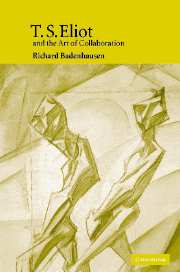Book contents
- Frontmatter
- Contents
- Acknowledgments
- List of abbreviations
- Introduction – Reaching the stillness of music
- 1 “Speaking as ourselves”: Authorship, impersonality, and the creative process in the early essays
- 2 A conversation about “the longest poem in the English langwidge”: Pound, Eliot, and The Waste Land
- 3 “Helping the poets … write for the theatre”: The transitional essays on collaboration, community, and drama
- 4 A dramatist and his midwives: Eliot's collaborations in the theatre
- 5 The Possum and the “creating critick”: Eliot's collaboration with John Hayward
- Conclusion – Placing collaboration in perspective: Voice and influence in the late essays
- Notes
- Index
2 - A conversation about “the longest poem in the English langwidge”: Pound, Eliot, and The Waste Land
Published online by Cambridge University Press: 22 September 2009
- Frontmatter
- Contents
- Acknowledgments
- List of abbreviations
- Introduction – Reaching the stillness of music
- 1 “Speaking as ourselves”: Authorship, impersonality, and the creative process in the early essays
- 2 A conversation about “the longest poem in the English langwidge”: Pound, Eliot, and The Waste Land
- 3 “Helping the poets … write for the theatre”: The transitional essays on collaboration, community, and drama
- 4 A dramatist and his midwives: Eliot's collaborations in the theatre
- 5 The Possum and the “creating critick”: Eliot's collaboration with John Hayward
- Conclusion – Placing collaboration in perspective: Voice and influence in the late essays
- Notes
- Index
Summary
In March of 1922, T. S. Eliot wrote Ezra Pound to solicit his assistance in launching The Criterion, the influential quarterly Eliot eventually edited for over sixteen years. Eliot envisioned the journal as a vehicle that would allow for the collective articulation of the modernist program, yet with a decidedly internationalist slant: the same week he posted the Pound letter, Eliot contacted both Valery Larbaud and Hermann Hesse seeking contributions for the review. In this regard, he was following the lead of Pound, who had earlier understood the importance of trying to unite modernism's work under the umbrella of a single publication, like Scofield Thayer's Dial. Pound had always conceived of modernism as a collaborative affair, which is why he was so amazed upon first reading Eliot's early work to learn that the poet had seemingly developed without the assistance of other members of the circle. Because Pound simply could not comprehend modernism as anything but a shared experience, he expressed surprise to Harriet Monroe that Eliot had “actually trained himself and modernized himself on his own” (L 40). Collaboration gave weight to individual literary works by highlighting their association with a collective body. It was this approach that Eliot sought for his own project, for collaboration possessed the major advantage of allowing Eliot to maintain exclusive control over the content and direction of the message.
- Type
- Chapter
- Information
- T. S. Eliot and the Art of Collaboration , pp. 62 - 110Publisher: Cambridge University PressPrint publication year: 2005



